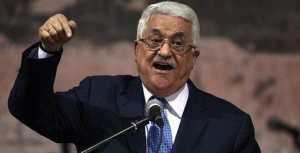
The decision to withhold payments began last year when Israel’s Knesset passed a law requiring an ‘equal amount’ deducted from tax transfers to the PA, unless the generous monthly stipends to Palestinian security prisoners and their families ceased.
– Outraged PA officials condemned the decision, threatening it would damage ongoing security cooperation.
By i24NEWS
Israel’s security council approved a million dollar freeze on funds transferred to the Palestinian Authority (PA) in a bid to offset terrorist’s salaries, after months of bureaucratic wrangling culminated in the government’s sizable to slash the West Bank-based body on Sunday.
The tax revenue cut amounts to approximately $138 million, which is over NIS 500 million and according to media reports will likely be deducted incrementally over a 12-month period.

Abbas’ pensions to terrorists
The deduction is deemed to be relative to the said amount that the PA allocates for stipends given to Palestinian prisoners in Israeli custody as well as the families of the convicted terrorists.
According to the statement released by the security council on Sunday, Prime Minister Netanyahu who is also acting defense minister, has instructed the defense establishment “to examine further payments that the PA pays in connection with terrorism.”
The process began in July of last year when Israel’s parliament passed a law requiring a decrease in tax transfers to the PA unless welfare payments to Palestinian security prisoners and their families stopped.
Last week an Israel Hayom report said that Israel’s defense establishment was in the “advanced stages” of compiling data on PA payments to determine how much funding will be withheld. Following this assessment, the matter was subject to cabinet approval.
Netanyahu has come under increasing pressure, especially from those on the right of the political spectrum, to penalize the PA in the wake of the brutal murder of 19 year-old Ori Ansbacher on February 7. The Palestinian suspect Arafat Irfayia reportedly admitted that the killing was “nationalistically-motivated.”
“By the end of the week, the staff-work necessary for implementing the law on deducting terrorists’ salaries will be completed,” Netanyahu — who is seeking re-election in the country’s upcoming April 9 general election — told journalists last week referring to today’s deadline.
Palestinian Prime Minister Rami Hamdallah said the move amounted to a “theft of Palestinian public money” and showed “Israel’s enactment of racist laws in support of the occupation” which “undermined the two-state solution.”
Speaking to Kan public broadcaster, a PA official warned that “this could jeopardize the Palestinian economy and undermine the PA’s ability to pay its salaries on time.”
Earlier this month, the Palestinian head of civil affairs Hussein al-Sheikh published a letter stating that if the decision was approved by Israel, the PA would refuse to accept all tax money that Israel collects on its behalf in an effort to protest the move.
In addition, the letter warned that the PA would work to sue Israel in the international courts.

Neutralized Palestinian terrorist, after failed stabbing attack on IDF soldiers near West Bank city of Nablus, on 21 Jan, 2019, will now begin collecting, along with his family, a monthly stipend during the entire period of his incarceration by Israeli authorities. – Photo: IDF Spokesperson’s Unit
“No country in the world should fund despicable murderers who have killed its people,” Israel’s Ambassador to the United Nations Danny Danon said on Sunday. “The blood money the Palestinian Authority gives to terrorists symbolizes the culture of terror and incitement,” he continued.
Israel views the Palestinian government’s refusal to end the payments as evidence of its continued support for terrorism against the Jewish state. Whilst, the PA repeatedly reaffirms that the payments are a form of welfare to the families who have lost their main breadwinner and denies it seeks to encourage violence.
However the pressure goes both ways, as the security nexus at the heart of the calcified conflict between Israel and the Palestinians means it is in Israel’s interest for the PA to continue to keep the peace in the territories under its control.
Individuals in Israel’s security establishment have warned that the cuts to the PA’s budget could further destabilize the West Bank triggering new terror attacks against Israelis.
At the same time the Palestinian reaction to the decision signaled that former collaboration would take a hit.
The Palestinian economy is dysfunctional and severely handicapped due to security blockades and underdevelopment. Despite registering stable growth, the situation in the West Bank is close to catastrophic, with soaring unemployment and little prospects for structural development.
It is even worse in the Gaza Strip, where 2 million people live in an enclave with very little opportunities for economic activity, and minimal trade links.
It has come under further strain in the last year, as a diplomatic breakdown with the US has led to the disengagement of one of the Palestinians’ largest aid donors.

President Trump tells Palestinian serious message in Bethlehem, but ignored by autocrat Mahmoud Abbas’ Palestinian Authority. – Screenshot: White House/IsraelandStuff.
Last week President Donald Trump’s administration officially ended its financial support for Palestinian security services.
Israel collects funds from imports into the West Bank and Gaza, and other taxes, and forwards a large part of it to the PA, after deducting some payments for water and electricity. This constitutes the largest part of the Palestinian government’s budget.
This is part of the Paris agreement, a set of rules signed in 1994, which were meant to be temporary but remained in place ever since. The Palestinians set out to convince parties to renegotiate these agreements in December last year, and sources confirmed that the Israeli government was opened to the idea ‘in principle,’ according to Israeli financial paper Globes.
View original i24NEWS publication at:
https://www.i24news.tv/en/news/israel/195497-190217-israel-s-security-council-mulls-over-slashes-to-pa-tax-revenue






 Israeli New Shekel Exchange Rate
Israeli New Shekel Exchange Rate